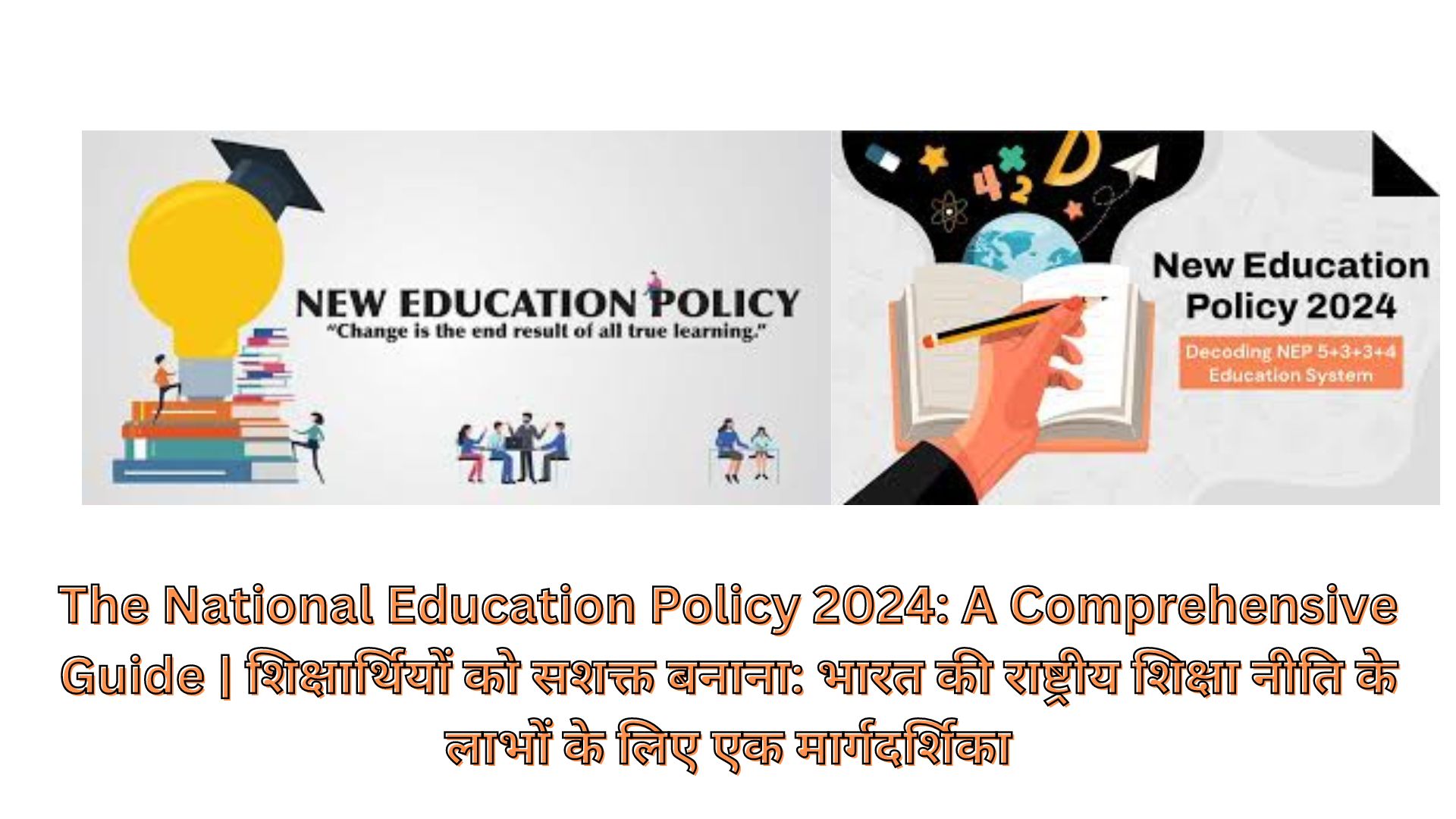
India’s education system is undergoing a significant transformation with the implementation of the National Education Policy 2024. This policy aims to revolutionize education by making it more holistic, flexible, and accessible for all. Here’s a comprehensive guide to the key features, benefits, and timeline of National Education Policy 2024.
Key Features of The National Education Policy 2024
- Universalization of Education: National Education Policy 2024 ensures education for all from pre-school to secondary level (with 100% Gross Enrollment Ratio by 2030), excluding medical and law studies.
- Revamped School Structure: The traditional 10+2 structure is replaced with a 5+3+3+4 system, comprising 3 years of pre-school, 5 years of primary school, 3 years of middle school, and 4 years of secondary school.
- Emphasis on Foundational Literacy & Numeracy: The NIPUN Bharat mission focuses on developing strong reading, writing, and arithmetic skills in children by the end of Grade 3.
- Flexible Subject Choice: Students can choose subjects across disciplines, eliminating rigid streams like Science, Commerce, and Arts.
- Multilingual Education: Mother tongue or regional language is the medium of instruction until Grade 5, promoting better comprehension.
- Focus on Vocational Education: Skill development is integrated from Class 6 onwards, with internships and vocational testing to equip students for diverse career paths.
- Coding from Class 6: National Education Policy introduces coding as a part of the curriculum to prepare students for the digital age.
- Holistic Development: The policy emphasizes physical education, extracurricular activities, and life skills for well-rounded development.
- Teacher Training & Reforms: A 4-year B.Ed program becomes the minimum qualification for teachers, ensuring quality instruction.
Benefits of The National Education Policy 2024
- Improved Learning Outcomes: The focus on foundational skills, flexible learning, and diverse teaching methods will enhance student understanding and achievement.
- Enhanced Employability: Skill development and vocational training will better prepare graduates for the job market.
- Reduced Burden on Students: Continuous assessments and potentially twice-yearly board exams may reduce exam pressure.
- Increased Access to Quality Education: Universalization and focus on regional languages ensure inclusivity for all learners.
- Globally Competitive Education System: National Education Policy aims to create a world-class education system that fosters innovation and entrepreneurship.
Timeline of The National Education Policy 2024
- 2014: National Education Policy formulation included in Bharatiya Janata Party manifesto.
- 2015-2019: Consultation process with stakeholders, committee formation, and draft policy preparation.
- 2020: National Education Policy 2024 launched.
- 2021-Present: Ongoing implementation, curriculum development, and teacher training initiatives.
Registration Process for the MYNational Education Policy2020 Platform:
To register on the MYNational Education Policy2020 platform, please adhere to the following steps:
- Visit the official website of the MYNational Education Policy2020 platform https://ncte.gov.in/Website/Hindi/Index.aspx.
- The homepage will appear.
- Click on the “Registration” option.
- A new page will open where you’ll need to input the following details:
- First name
- Middle name
- Last name
- Gender
- Date of birth
- Mobile number
- Email address
- Click on the “Register” button to complete the process successfully.
Login Process for the MYNational Education Policy2020 Platform:
To login to the MYNational Education Policy2020 platform, follow these steps:
- Go to the official website of the MYNational Education Policy2020 platform.
- The homepage will display.
- Select the “Login” option.
- A new page will appear, prompting you to enter your username, password, and captcha code.
- Click on the “Login” button to access your account.
The National Education Policy Contact Information:
For any further assistance regarding the National Education Policy, you can reach out through the following contact details:
- Email: dkchaturvedi@ncte-india.org
- Contact Numbers: 011-20893267, 011-20892155
The National Education Policy 2024 promises a transformative future for Indian education. By prioritizing holistic development, flexibility, and skill-based learning, National Education Policy 2024 has the potential to empower students and make India a global knowledge leader.
Read more:
The National Education Policy FAQs:
What are the key features of the National Education Policy 2024?
The key features include universalization of education, revamped school structure, emphasis on foundational literacy & numeracy, flexible subject choice, multilingual education, focus on vocational education, introduction of coding from Class 6, holistic development, and teacher training reforms.
How does the National Education Policy 2024 benefit students?
The policy aims to improve learning outcomes, enhance employability, reduce burden on students, increase access to quality education, and create a globally competitive education system.
What is the timeline of the National Education Policy 2024?
The timeline includes its formulation being included in the Bharatiya Janata Party manifesto in 2014, consultation process from 2015 to 2019, launch in 2020, and ongoing implementation and development activities from 2021 onwards.
What is the structure of the revamped school system under the National Education Policy 2024?
The traditional 10+2 structure is replaced with a 5+3+3+4 system, consisting of pre-school (3 years), primary school (5 years), middle school (3 years), and secondary school (4 years).
How does the policy address language in education?
It promotes multilingual education by using the mother tongue or regional language as the medium of instruction until Grade 5, facilitating better understanding.
What measures are taken to enhance teacher quality under the National Education Policy 2024?
The policy mandates a 4-year B.Ed program as the minimum qualification for teachers, ensuring better instructional quality.
How can one register on the MYNational Education Policy2020 platform?
What steps are involved in logging in to the MYNational Education Policy2020 platform?
How can individuals seek further assistance regarding the National Education Policy?
They can reach out via email to dkchaturvedi@ncte-india.org or contact the provided numbers: 011-20893267, 011-20892155.
What transformative potential does the National Education Policy 2024 hold for Indian education?
By prioritizing holistic development, flexibility, and skill-based learning, the policy has the potential to empower students and elevate India as a global knowledge leader.

